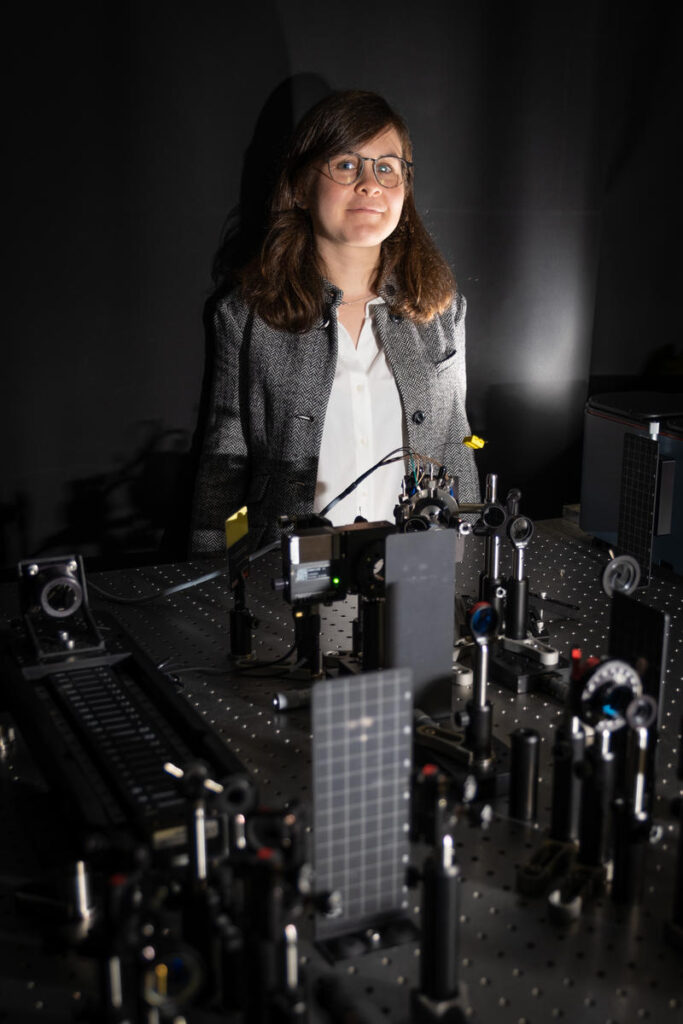Weichman Lab Takes off with First Grant
Marissa Weichman, assistant professor in the Department of Chemistry, has been awarded a seed grant from the American Chemical Society Petroleum Research Fund through the Doctoral New Investigators Program, one of 33 such grants awarded nationally during this funding cycle.
The grant is given to early-career scientists pursuing fundamental research with broad applicability to the petroleum or fossil fuels fields. It will support the Weichman lab’s proof-of-concept research on the chemistry of polaritons in gas-phase molecules.
“This is a really big deal for me,” said Weichman. “It’s a nice external validation from my community that the research we’re proposing to do is interesting and worth supporting and probably fruitful.”

Assistant Professor Marissa Weichman with an ultrafast laser system, which was recently installed in her lab.
“The other nice thing about this grant is it’s a platform where you can submit your ideas and get really detailed reviewer feedback,” Weichman added. “These are people with a level of expertise giving you feedback on what might work – ‘Here’s maybe a thing you haven’t thought of, here’s a platform where you can submit your ideas and get really detailed reviewer feedback,’ ” Weichman added.
“These are people with a level of expertise giving you feedback on what might work – ‘Here’s maybe a thing you haven’t thought of, or here’s someone’s work you should look into.’ That is a huge help.”
Weichman joined the Department in the summer of 2020 to develop novel spectroscopic tools to examine chemical interactions in cold molecules and hybrid light-matter systems. Since then, she has been building and outfitting her lab and hiring researchers, including postdoc Ashley Fidler.
This is the Weichman lab’s first grant.
Fidler is working on one aspect of polaritons, quantum states that have mixed identities of partial light and matter and can exhibit radically different behavior than the individual components. The ACS PRF grant will fund a different regime for the lab’s research under the project, Gas-Phase Polariton Chemistry: Reaction Kinetics of Methane under Vibrational Strong Coupling.
In short, Weichman will use optical cavities – two facing mirrors that reflect light in an enclosed environment – to investigate the behavior and properties of molecules inserted into that cavity. Cavity quantum electrodynamics holds that virtual photons flicker in and out of existence in the vacuum. Weichman will investigate how these virtual particles interact with molecules and change their behavior.
“We are trying to use the cavity to expand or alter the reactivity of gas-phase methane, which is a major component of natural gas and an important chemical feedstock,” said Weichman. “We hope to develop novel tools to streamline commercial chemical processes and capitalize on these limited feedstock resources. Changing chemical reactivity through strong light-matter interactions might be one way to achieve this.
“It is a little bit of a fishing expedition, but that’s the great thing about seed grants like this one,” said Weichman. “What we’re going to do is study a lot of different chemistry in these environments and try to find instances where the interaction with the cavity provides a really useful handle to alter reactivity.”
The first PRF grants were awarded in the early 1950s, and administered by the American Chemical Society in support of fundamental research directly related to petroleum or fossil fuels at nonprofit institutions in the United States and other countries. The DNI grants are intended as starter grants for new faculty.
